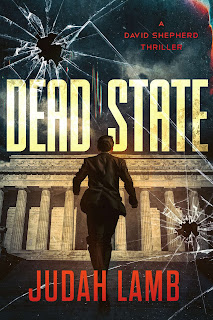Historical Mystery
Date Published: 10-23-2023
Publisher: Level Best Books' Historia Imprint
A historical mystery based on Helms' Derringer Award-nominated EQMM short story "The Cripplegate Apprehension".
In 1843 London, a Scottish woodturner named Daniel M'Naghten gunned down Edward Drummond, the private secretary to Prime Minister Robert Peel, while Drummond strolled the streets of Whitehall. M'Naghten believed he shot the Prime Minister and, after being informed otherwise and making a brief statement at his arraignment, he never spoke in public about the crime again. M'Naghten was represented at trial by firebrand Queen's Counsel Alexander Cockburn, who intended to plead insanity and rewrite four hundred years of English Common Law in the process. In this fictional retelling of the famous historical event, Cockburn recruits legendary London thief-taker Vicar Brekonridge to travel to Glasgow, M'Naghten's home, and find witnesses who can bolster the insanity defense. What Brekonridge finds instead suggests that M'Naghten was part of a frightening conspiracy to bring down the British government.
PRAISE FOR VICAR BREKONRIDGE
"In a seamless blending of historical fact and narrative skill, Richard Helms reimagines the sensational case of Daniel M'Naghten, whose 1843 murder trial set a precedent that reverberates to this day. Helms has crafted a thoroughly gripping historical mystery that will leave readers eager to hear more of the “notorious thief-taker” Vicar Brekonridge.
—Daniel Stashower, Edgar Award Winning Author of American Demon
“VICAR BREKONRIDGE may be one of (Richard Helms’) more intriguing creations...a fascinating character to follow around, as he makes his way through the streets and back alleys of London, through its open air markets and dingy taverns or journeying out to Newgate Prison to visit a man he put there...For all his rough-and-tumble manners, cynical bravado, mercenary motives and sliding scale honesty, in a shady profession not particularly known for its integrity, he struts through the streets of London, a cloud of hemp in his wake, hewing to some inexplicable personal code that betrays a startling even-minded empathy for the criminals he hunts down, and a concern for — of all things — justice, which reminded me of Sam Spade‘s moral ambivalence. “
—Kevin Burton Smith, Thrilling Detective Website
Interview with Richard Helms
How many books have you written and which is your favorite?
I just finished my 26th novel (Bump And Run), the first title in what I hope will be a new series featuring a North Carolina SBI agent who solves murders in small towns in the western half of the state. I’m starting on Number 27 probably in November. It will be the fifth title in my San Francisco-based Eamon Gold Series.
My favorite book is usually my most recent one, but I’m especially proud of the two books that have been published by Level Best (A Kind and Savage Place and Vicar Brekonridge). Both are historical novels. A Kind and Savage Place examines the monumental changes in America between the 1950s and 1980s, as seen through the eyes of people living in a small North Carolina farming town with a dark history of violence and oppression. Vicar Brekonridge travels all the way back to 1843 London, at a time when Great Britain was being ripped apart by Chartist worker uprisings. It follows the true story of the murder of Prime Minister Robert Peel’s private secretary Edward Drummond by obscure Scottish woodturner Daniel M’Naghten, as examined by fictitious hulking thief-taker Vicar Brekonridge.
Among my unpublished works—the ones I’m shopping around now—I’m particularly excited about 22 Rue Montparnasse, my first historical novel that doesn’t revolve entirely around a criminal investigation. It follows the lives of two young friends—veterans of WWI—who decide to stay in Paris. One wants to be a painter, the other a writer. They join the legions of American expats who became Gertrude Stein’s ‘Lost Generation’, and—like most of them—are not destined to become famous. It’s a corker of a book, and I hope it will find a good publishing home.
If you’re planning a sequel, can you share a tiny bit about your plans for it?
A Kind and Savage Place, as it happens, was a prequel to my already published Judd Wheeler series of novels set in tiny Prosperity, North Carolina (Six Mile Creek, Thunder Moon, Older Than Goodbye). The fourth book in that series, which I hope to write next year, picks up on a lot of the conflicts in A Kind and Savage Place, forty years later, and brings the story full circle. I have a feeling it will wrap up the Judd Wheeler saga, but I write a lot of stories set in that county these days, so he could show up again.
As for Vicar Brekonridge, I have completed about sixty pages on a sequel titled Brekonridge in America, which covers events that take place during a quarter century break near the end of the first book. I have notes collected for a third title in the series, Brekonridge Down Under, in which the thief-taker is dispatched to Australia to retrieve a man who was transported there for his criminal acts.
Do you want each book to stand on its own, or are you trying to build a body of work with connections between each book?
I definitely allow my characters to jump between series. Mark Lovell, the protagonist of my first novel (The Valentine Profile) shows up from time to time in other works, usually providing a psychological consultation. A character named Angeloe Teeter from A Kind and Savage Place also plays an important role in my most recent book Bump And Run. I have a character named James Hong in my first Eamon Gold novel (Grass Sandal) who also appears in the last Pat Gallegher novel (Paid in Spades) all the way across the country.
I’ve written a number of short stories based in Bliss County, North Carolina, where Prosperity is located, featuring a variety of protagonists. I plan to have every one of them play a role in the next (possibly last) Judd Wheeler novel, just for fun.
I am totally open to literary incest. I enjoy having characters from one series suddenly pop up in another.
How did you come up with the title for your book? What does the title mean?
Being eponymous (Vicar Brekonridge), you’d think it would be easy, right? Not so fast. I struggled for months trying to find the right title for this novel. I focused on the trial itself, and debated titles like Reason On Trial and Defect of Reason. Nothing felt right or carried the impact I wanted for the title. Finally, on about the fifteenth rewrite, I realized the story, which I had intended to be an examination of the trial itself, had become effectively a private eye novel, so I just called it Vicar Brekonridge. I still think there’s a better title out there, somewhere, but I’ll be damned if I can figure out what it might be.
How long did it take you to write this book?
The research took a long time. I’m a psychologist, but I’m also a history buff, so deep-diving into Victorian history was a lot of fun. My research file for the book runs to about eight hundred pages and took the better part of a year to collect and digest. I also spent a lot of time studying Richard Moran’s exhaustive examination of the trial (Knowing Right From Wrong), along with the trial transcript itself, and used a number of his conclusions as the foundation of my novel. The first draft, which included the entire real-life transcript of the M’Naghten trial, ran over eight hundred more pages. I eventually whittled it down to just shy of a hundred thousand words, or roughly four hundred pages. Writing the first draft took about six months. The rewrites—I think there were eight or nine—took another year, but I was writing another book at the same time.
What did you learn when writing the book?
I was most fascinated by the politics of middle 19th century Britain. It was a time during which only the better-born people were allowed to serve in Parliament, even in the House of Commons. Tradesmen, farmers, and laborers were systematically excluded from participation in the formation of policies that directly affected them. Labor unions were rare, where they existed at all, so common people were frequently powerless to affect the system that subjugated them and kept them from prospering. The attitudes among the powerful and privileged were that this was a good thing, since those with little education or sophistication would only be confused by the intricacies of government. It was a truly stratified society, which led to the uprisings and riots by groups like Chartists, socialists, and the Anti-Corn Law League. It was an overwhelmingly oligarchic society that presaged the robber barons of the Gilded Age. I saw a number of corollaries to political conditions today, and in a way that makes Vicar Brekonridge’s 1843 London and Glasgow a mirror for modern conditions.
What surprised you the most?
As both a practicing forensic psychologist and college professor, I was very familiar with the M’Naghten Rule on insanity that arose from the trial. What I didn’t realize before was that it almost certainly would not have applied to M’Naghten himself. Modern research strongly suggests that M’Naghten wasn’t insane at all, but being found insane served a multitude of political purposes. The so-called M’Naghten Rule, which is still used to determine criminal insanity in all of Britain and half of the United States, was established after the trial, in response to the public perception that M’Naghten wasn’t insane at all and that justice was not served for Edward Drummond. You’d think they’d have taught us this in grad school, right?
Have you ever killed off a character your readers loved?
I’ve killed off a few of them I loved! I’m not sure I have enough readers for any of my characters to feel particularly lionized, however. I’ve never killed off a main protagonist or sidekick. I’ve put a bunch of them in danger, though, and for a couple of them it was a close shave.
What do you do to get inside your character’s heads?
Being a psychologist, I should be an expert in motivation and internal conflicts, right? Even so, this is among the hardest things for me, as I’m also a high functioning autistic, though I prefer to call myself an Aspie, however incorrect that might be politically. Accurately perceiving emotions and motivations in interpersonal contact in real time is very difficult for me, which is why I was a much better college professor than I was a therapist. I tend to either make assumptions about people that aren’t correct, or I miss important signals from them. Like a lot of Aspies, I frequently resort to over-analysis of my surroundings, which kind of naturally leads to mystery writing.
As opposed to a conversation, writing gives me much more time to deliberate over what my characters might be thinking and how they are responding to events around them. I write most of my private eye novels in first person, because that allows me to focus on only one train of thought. Trying to get into the heads of five or six people in a given scene in a third person novel is much harder, because I have to keep in mind their various motivations and backstories—both those already established in the story and those living in my head, yet unwritten. After a while, it’s like standing inside a game show hurricane machine. Crowd scenes are particularly difficult for me to write, so I seldom write one in which more than three people are conversing. More than that, and someone is going to be neglected.
Writing essentially gives me the time I lack in direct conversation to figure out what each character wants, and to accurately tailor their dialogue and behaviors to be consistent. The side benefit is that I’m infinitely more witty on paper than I am in person.
Thanks for the opportunity to sit a spell and share with your readers! I hope you’ll all take a look at Vicar Brekonridge, and that you’ll give my other series and titles a try as well.
About the Author
A lifelong North Carolinian, Richard Helms retired from active practice as a forensic psychologist in 2005, after working in the field for over two decades. At one time, he was the only court psychologist covering four counties in NC. A court-recognized expert in sex crimes and the psychology of sex offenders, mystery writing was an easy transition and a logical next step after Helms left his professional career to become a college professor in Charlotte. He retired from teaching in the summer of 2016 to become a full time writer. Helms has twenty-two novels in print.
Besides writing, Helms loves gourmet cooking, woodworking, traveling, simracing, amateur astronomy, playing with his grandsons, and rooting for the Carolina Tarheels and Carolina Panthers. For a peek at his non-writing life, check out his other website at www.rickhelms.com
The parents of two grown children, Richard Helms and his wife Elaine live in Charlotte, NC.
Contact Links
Purchase Link













































































































0 comments:
Post a Comment